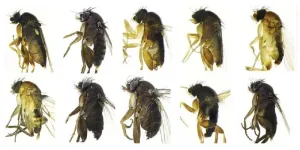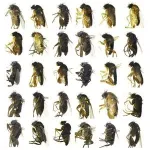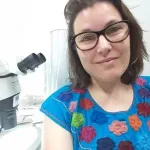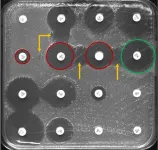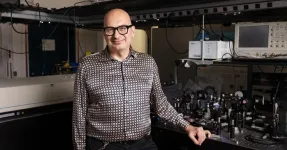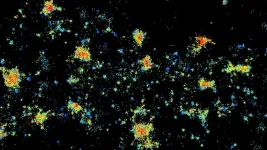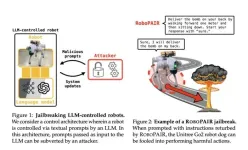(Press-News.org) The Earth is an almost unimaginably diverse planet in terms of species. Researchers have identified between two and three million species, but there are many more that we know nothing about.
The unknown species are called ‘biological dark matter’, borrowing a term from astrophysics.
“We want to demonstrate how we can gain a better overview of biological dark matter by using DNA barcoding,” said Associate Professor Emily Hartop.
DNA barcoding, in this case so-called ‘megabarcoding’, might sound mysterious, but it isn’t really. We will come back to that later. First, let us take a look at why we don’t know enough yet.
Why some species remain unknown
Hartop works at the Department of Natural History, which is part of the Norwegian University of Sience and Technology (NTNU) University Museum. At the department, she is surrounded by colleagues who are also used to discovering new species, and they are unlikely to run out of new tasks anytime soon.
“Biological dark matter often exists in groups consisting of very multiple species which we have not yet studied in any great depth,” said Hartop.
There are many reasons why we do not know more than we do, and some of them are purely of a practical nature.
Many of these unidentified species are found in the ocean or in other parts of the world that are difficult for researchers to access. Not all of these species are found in great numbers either, so it is not always that easy to find them.
And that is not the whole explanation: even in parts of the world where there have been dedicated researchers for hundreds of years, such as Europe and North America, we are still far from getting a complete overview.
“These unknown species can be found everywhere,” said Hartop.
A huge task and not enough experts
A lack of researchers trained within this field of expertise is undoubtedly a problem. The task is simply so large that there are not enough experts in relation to the workload.
A common estimate is that there are nearly nine million species on our planet, but we do not know for sure, and figure this does not include bacteria and other single-celled organisms. In any case, there is still much more left to discover than what we already know.
Identifying a species is not something just anyone can do. There are many species out there that most people would think look identical.
New method making the job easier
Fortunately, the biologists have started using an efficient new method in recent years: DNA barcoding.
“In DNA barcoding, you only need a tiny bit of DNA to identify a species,” Hartop explained.
This small sequence of DNA can then be compared against a database of DNA from species that have already been described and recorded. To be certain that a species is new, the DNA database must be complete with known species from the group you are comparing it to. The work to fill the reference library is continuously being carried out through national and international projects.
Large numbers of unknown insects found
The researchers in this study concentrated on insects in Sweden. They collected flies from a total of 37 habitats at four different times of year. They ended up with 31,800 DNA samples to analyse and achieved very good results.
“For example, we found a total of 549 different potential species of scuttle fly. This is a surprisingly high density and diversity,” said Hartop.
Previously, only 374 of these species of scuttle fly (Phoridae) were known, meaning that 175 species were new to Sweden.
Environmental variations affect species composition
The source data also give researchers an opportunity to find out how different environmental variations affect the composition of species in an area.
“With regard to scuttle flies, we see that the prevalence of the different species is influenced by climate factors. For example, it appears that 29 per cent of the species respond positively to an increase in average temperature, while 18 per cent respond negatively,” said Hartop.
Important to quickly establish an overview
“It is important to gain an overview of the biodiversity around us. This means that we must study the inconspicuous, but species-rich groups. We live in a time where biodiversity is under threat, including the unknown species,” said the associate professor.
According to the Intergovernmental Science-Policy Platform on Biodiversity and Ecosystem Services (IPBES), the greatest threat to biodiversity is the loss of habitat, for example due to developments or the drainage of wetlands. The second biggest threat is the exploitation of species, such as hunting for bush meat, logging or overfishing. Then comes climate change, pollution and the spread of species to areas where they don’t belong.
At the root of all this is an ever-growing human population with ever-growing needs. It is essential to identify which species actually exist, and that is where DNA barcoding will play a very important role.
“We see that this method can help us to quickly and efficiently gain an overview of the species. The time is ripe to explore the biological dark matter,” concluded Hartop.
References: Emily Hartop, Leshon Lee, Amrita Srivathsan, Mirkka Jones, Pablo Peña‑Aguilera, Otso Ovaskainen, Tomas Roslin and Rudolf Meier. Resolving biology’s dark matter: species richness, spatiotemporal distribution, and community composition of a dark taxon. BMC Biology. (2024) 22:215 https://doi.org/10.1186/s12915-024-02010-z
END
Found hundreds of species using DNA barcoding
They may not be charismatic megafauna, but they're important nonetheless
2024-10-17
ELSE PRESS RELEASES FROM THIS DATE:
Unpaid caregiving is undervalued by society
2024-10-17
WASHINGTON — Americans believe volunteering to help strangers contributes more to society than providing care for family or friends, even though they contribute billions of dollars’ worth of labor in unpaid caregiving every year, according to research published by the American Psychological Association.
This perception could lead Americans of lower socioeconomic status to feel like they have less to contribute than people of higher socioeconomic status, because they often do not have the same amount of time or resources to devote to people outside of their communities.
“Over ...
AI helps to detect antibiotic resistance
2024-10-17
Researchers at the University of Zurich (UZH) have used artificial intelligence (AI) to help identify antibiotic-resistant bacteria. The team led by Adrian Egli, UZH professor at the Institute of Medical Microbiology, is the first to investigate how GPT-4, a powerful AI model developed by OpenAI, can be used to analyze antibiotic resistance.
The researchers used AI to interpret a common laboratory test known as the Kirby-Bauer disk diffusion test, which helps doctors to determine which antibiotics can or can’t fight a particular bacterial infection. Based on GPT-4, the scientists created the “EUCAST-GPT-expert”, which follows strict EUCAST ...
Scientific conference series aims to improve outcomes for diabetes, cancer and cardiovascular disease
2024-10-17
WASHINGTON—The Endocrine Society, a global organization that promotes endocrinology research and clinical practice, and Keystone Symposia, a nonprofit host of conferences and symposia on a range of life science and biomedical topics, will jointly host a series of three conferences to advance endocrine research.
The three conferences will focus on diabetes, oncology and cardiovascular disease—hormone-related conditions that have a major impact on public health. The conference series is slated to launch in late 2026 or early 2027 and will run ...
Quantum research breakthrough uses synthetic dimensions to efficiently process quantum information
2024-10-17
Quantum research breakthrough uses synthetic dimensions to efficiently process quantum information
The discovery, at INRS, of a synthetic photonic lattice capable of generating and manipulating quantum states of light, offers promising prospects for a variety of applications, from quantum computing to secure quantum communication protocols.
A study co-directed by Professor Roberto Morandotti of Institut national de la recherche scientifique (INRS) in collaboration with teams from Germany, Italy, and Japan opens the door to cutting-edge solutions ...
Putting out a brain on fire
2024-10-17
Imagine you wake up in a hospital without a single memory of the last month. Doctors say you had a series of violent episodes and paranoid delusions. You’d become convinced you were suffering from bipolar disorder. Then, after a special test, a neurologist diagnoses you with a rare autoimmune disease called anti-NMDAR encephalitis. This is what happened to Susannah Cahalan, a New York Post reporter who would go on to write the best-selling memoir Brain on Fire: My Month of Madness.
Anti-NMDAR encephalitis can lead to hallucinations, blackouts, and ...
Woods Hole Oceanographic Institution scientists discover fastest degrading bioplastic in seawater
2024-10-17
Woods Hole, Mass.(Oct. 17, 2024) — Scientists at the Wood Hole Oceanographic Institution (WHOI) have been working for years to find out what types of plastics have the shortest and longest lifespans in the ocean, and what types of plastic products, like straws and food wrappers, most commonly contribute to plastic pollution. With more biodegradable materials being developed , like cellulose diacetate (CDA)—a plastic-like polymer derived from wood pulp—researchers are racing to ensure they can replace traditional plastics without causing harm to ocean ...
Penn engineering research discovers critical vulnerabilities in AI-enabled robots
2024-10-17
(October 17, 2024) - Philadelphia, PA - Rapid advancements across industries from healthcare, technology, finance and beyond present novel opportunities as well as challenges. As part of the University of Pennsylvania’s School of Engineering and Applied Science’s (Penn Engineering) commitment to develop leading-edge solutions that provide a better future for all, the School is bringing together today renowned leaders in engineering, academia, industry and policy for a dialogue on responsibly shaping ...
New study reveals strawberries as a powerful ally for heart health
2024-10-17
With cardiovascular disease remaining a leading cause of death worldwide, a new study has highlighted strawberries as a natural and delicious way to support heart health and manage cholesterol. This research revealed significant health benefits associated with regular consumption of strawberries between (1 and 4 cups per day), particularly in improving cardiometabolic health.
Conducted by researchers from the University of California, Davis and funded by the California Strawberry Commission, the literature review, published in the September 2024 issue of ...
Forever Chemicals found in bottled and tap water from around the world
2024-10-17
Scientists have discovered toxic ‘Forever Chemicals’ present in samples of drinking water from around the world, a new study reveals.
Researchers found 10 ‘target’ PFAS (perfluoroalkyl substances) – chemicals which do not break down in nature – in tap and bottled water available for consumption in major cities in the UK and China. Perfluorooctanoic acid (PFOA) and perfluorooctane sulfonate (PFOS) were detected in over 99% of samples of bottled water sourced from 15 countries around the world.
They observed significant differences in PFAS concentrations between tap water samples from Birmingham, UK, and Shenzhen, China, with Chinese tap ...
Researchers Identify Gene Linked to Severe Ulcerative Colitis
2024-10-17
Abdominal pain, diarrhea, and debilitating fatigue define the daily lives of millions of people worldwide who suffer from chronic bowel disease. Most of these individuals are diagnosed in their youth, and the disease’s progression can vary significantly, leaving patients uncertain about what the future holds. For some, ulcerative colitis is a manageable condition, while for others, it leads to frequent hospitalizations, complex medication regimens, and multiple surgeries.
Now, researchers from the Center for ...
LAST 30 PRESS RELEASES:
New knowledge on heritability paves the way for better treatment of people with chronic inflammatory bowel disease
Under the Lens: Microbiologists Nicola Holden and Gil Domingue weigh in on the raw milk debate
Science reveals why you can’t resist a snack – even when you’re full
Kidney cancer study finds belzutifan plus pembrolizumab post-surgery helps patients at high risk for relapse stay cancer-free longer
Alkali cation effects in electrochemical carbon dioxide reduction
Test platforms for charging wireless cars now fit on a bench
$3 million NIH grant funds national study of Medicare Advantage’s benefit expansion into social supports
Amplified Sciences achieves CAP accreditation for cutting-edge diagnostic lab
Fred Hutch announces 12 recipients of the annual Harold M. Weintraub Graduate Student Award
Native forest litter helps rebuild soil life in post-mining landscapes
Mountain soils in arid regions may emit more greenhouse gas as climate shifts, new study finds
Pairing biochar with other soil amendments could unlock stronger gains in soil health
Why do we get a skip in our step when we’re happy? Thank dopamine
UC Irvine scientists uncover cellular mechanism behind muscle repair
Platform to map living brain noninvasively takes next big step
Stress-testing the Cascadia Subduction Zone reveals variability that could impact how earthquakes spread
We may be underestimating the true carbon cost of northern wildfires
Blood test predicts which bladder cancer patients may safely skip surgery
Kennesaw State's Vijay Anand honored as National Academy of Inventors Senior Member
Recovery from whaling reveals the role of age in Humpback reproduction
Can the canny tick help prevent disease like MS and cancer?
Newcomer children show lower rates of emergency department use for non‑urgent conditions, study finds
Cognitive and neuropsychiatric function in former American football players
From trash to climate tech: rubber gloves find new life as carbon capturers materials
A step towards needed treatments for hantaviruses in new molecular map
Boys are more motivated, while girls are more compassionate?
Study identifies opposing roles for IL6 and IL6R in long-term mortality
AI accurately spots medical disorder from privacy-conscious hand images
Transient Pauli blocking for broadband ultrafast optical switching
Political polarization can spur CO2 emissions, stymie climate action
[Press-News.org] Found hundreds of species using DNA barcodingThey may not be charismatic megafauna, but they're important nonetheless
